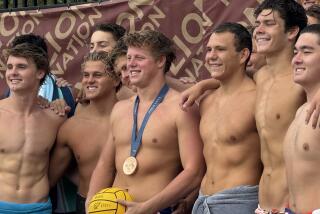THE SEOUL GAMES / DAY 12 : Water Polo : Slam Dunk Carries U.S. to Matchup Against Soviets
- Share via
SEOUL — The U.S. water polo team was just seconds away from being sent home empty-handed Tuesday afternoon at the Olympic Indoor Swimming Pool when none other than Terry Schroeder wrestled his way clear in front of the net and powered the ball in for a 10-9 victory over Hungary, a pass into the medal round and a chance to win the country’s first gold medal in this sport since 1904.
Schroeder called his desperation shot with 3 seconds left a “basic slam dunk” and said: “For those of us who were on the ’84 team, we were thinking that a lot of years of practice were going down the drain.”
Schroeder, the team captain and a 10-year team veteran, stayed at it for 4 more years after the heartbreaking tie with Yugoslavia in the Los Angeles Games that left the team with a silver medal.
But perhaps that tie had a hidden benefit. Schroeder, a 28-year-old chiropractor and the water polo coach at Pepperdine, might have retired with a gold medal. Goalie Craig Wilson might also have retired. But Wilson, 31, a computer analyst, was persuaded to come out of retirement by U.S. Coach Bill Barnett, (a math teacher and water polo coach at Newport Harbor High School) who convinced him that it would be terrible to waste his talent.
The U.S. team fills the pool with professionals--doctors, real-estate brokers, financial investment specialists--who have put their careers on hold to create what may be the strongest team the country has ever had.
Yugoslavia, the team that the United States beat in the first game here, also advanced from Group B to the final four and could end up being the team that the United States has to beat for the gold.
But first, on Friday, the United States would have to defeat the Soviet Union, which advanced from Group A. In the other semifinal, Yugoslavia will play West Germany. The winners will play for the gold medal Sunday.
Barnett cautioned against looking past the Soviet Union, a team that the United States hasn’t played in the Olympics since 1972, the year that the United States won a bronze medal.
“Against the Soviets we expect a very, very physical game,” Barnett said. “They hammer the hell out of you. They are one of the most physical teams we play, and they have a good fast break. (Evegeny) Sharanov is still a very good goalie, not as sharp as he once was, but that’s what happens when you get old.”
Upon hearing that, Wilson cringed.
Wilson and Sharanov are often mentioned in the same breath when talk turns to the best goalies in the world.
Wilson stopped 11 shots against Hungary Tuesday afternoon, keeping alive his streak of having stopped at least 10 shots in all 5 games here. But 9 did get past him. The Hungarian team has exceptional outside shooting.
The Hungarians pressed the Americans in a back-and-forth game. Hungary was leading, 8-7, when Mike Evans, the American scorer called “instant offense,” scored 2 quick goals to give the U.S. team a 9-8 lead with 30 seconds left.
That second goal, which Evans scored on a long shot after the ball had been stolen and pushed the length of the pool, was looking like the winning goal until Andras Gyongyosi tied it again with just 15 seconds to play.
A tie would have eliminated the United States from medal contention, putting Spain in the round of four.
So the United States used the next 12 seconds carefully, setting up a shot, passing the ball from Jody Campbell to Evans to Schroeder, the 2-meter man who was right in front of the net.
Schroeder had a Hungarian player hanging over him in the frantic scramble for control of the ball. The Hungarian goalie came out of the net a little to try to help. And that was when Schroeder muscled the ball forward into the front of the net. The ball rode back into the net on a wave.
Wilson had one last long shot to stop as the final seconds ticked off.
The U.S. team is two victories from a gold medal.
When the United States won the bronze, in 1972, the Americans on the team were mostly holdovers from 1968. When those players retired, Barnett said: “Then there was a drought in terms of players. Now we have a group of players who have been together since 1977, who won a silver medal in 1984.”
The U.S. team will start rebuilding after these players retire. One of the most exciting prospects is Matt Biondi, the swimmer who won seven medals here. He’s big (6-feet 6-inches) and he’s fast (he won golds at 50 meters and 100 meters) and he’s even experienced. He was an All-American at Cal.
Biondi is from California, which means he would fit right in. Of the 13 players on the current roster, 12 are from California. (Chris Duplanty, the newest and youngest member of the team is from Honolulu but attends UC Irvine.)
Jody Campbell, who had suffered a mild concussion in Monday’s game against Greece, was examined by Dr. James Puffer and given clearance to play against Hungary. He scored two goals, even though his playing time was limited. Barnett said: “We were told to watch him carefully and to get him as much rest as we could.” Campbell is expected to play against the Soviets.
More to Read
Go beyond the scoreboard
Get the latest on L.A.'s teams in the daily Sports Report newsletter.
You may occasionally receive promotional content from the Los Angeles Times.






